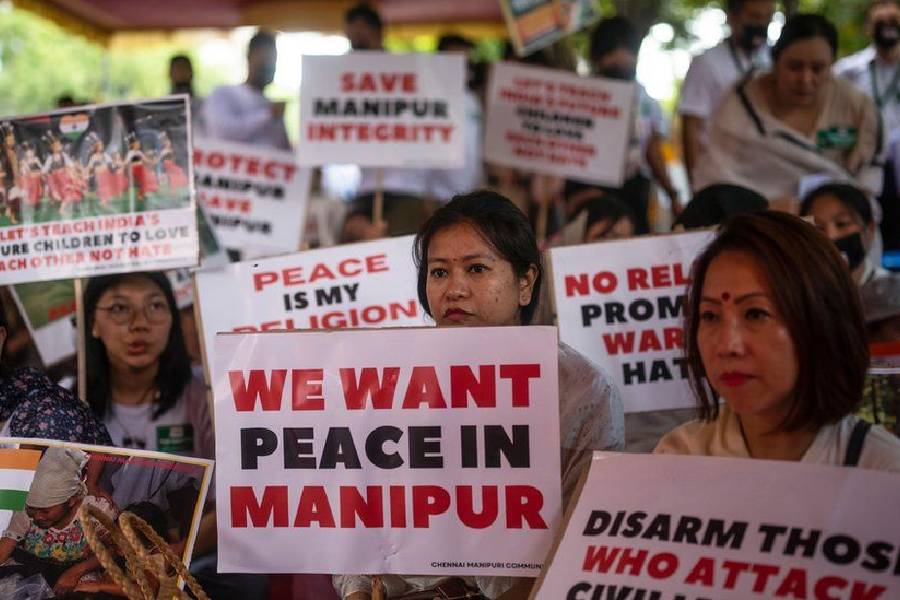Manipur is now into the second year of an unprecedented, bloody ethnic clash between the Kuki-Zo tribes concentrated at the foothills surrounding the central Imphal valley and the Meiteis from the valley. The conflict has claimed over 200 lives and displaced an estimated 60,000 people. This has been matched in scale by the loss of homesteads and properties to arson attacks and, worse still, the two sides have ethnic-cleansed each other from their traditional home grounds. In the higher reaches of the mountains are the Nagas.
The Kuki-Zos experienced the greater casualties, especially in the initial days after the violence erupted, as there were more of them settled in the valley, which is open to settlement by any Indian after the introduction of modern land revenue law in 1960 while Manipur was still a Union territory. However, the Meiteis still form an overwhelming majority here. This land law does not extend to the hills, except for some townships that opted in later years to integrate into the modern banking and financial system with mortgageable land holdings as currency. Although no law specifically states it, the general outlook is that the Meiteis are prohibited from owning land anywhere except in the valley and hence Meitei settlement in the hills and foothills is limited to these few townships. There were also those from the labour and professional classes taking residence in rented spaces for their livelihood.
The death-toll ratio between the Kuki-Zos and the Meiteis would roughly be 3:2. This imbalance would be even more acute in property losses, not only because there were more Kuki-Zos settled in the valley but also because Kuki-Zos who chose to make the valley their home largely belong to the affluent class.
However, in terms of displaced populations, the scale would be more balanced, and may even tip the other way. This is because while there are many wrecked peripheral villages where the hills meet the valley, belonging to both communities, Kuki-Zo villages are generally small, sometimes no more than a few houses. Meitei villages on an average run into several hundred houses.
The displaced are now living in community-run relief camps on both sides of the divide. Those who have visited even some of these would know of the sense of grief and loss that the displaced are burdened with. None expected this crisis to last so long and, now, as initial anger slowly transforms into despair, health workers predict the onset of mental health issues of epidemic proportions if nothing is done.
All the while, the state as well as the Central governments have remained outrageously conspicuous by their absence, either clueless or unwilling to intervene aggressively to bring the situation under control. Instead of showing resolve to end the mayhem, they still seem more concerned about conjuring scenarios behind which to hide their failures. The vacuum they have thus left in providing public security is now being filled by a plethora of armed militias.
Nobody has any doubt that the longer this conflict is allowed to persist in the absence of any tangible State intervention, the more mutated versions of these conflict actors will emerge. These are undoubtedly grotesque phenomena that the public dreads and detests but at the same time cannot disown or rubbish, for they are also seen as defenders of the people.
Meanwhile, what has been missing as the crisis continues to unfold is what has been referred to as the ‘moral imagination’ by peace and conflict scholar, John Paul Lederach. This is the ability of humans to see their own griefs and losses in their adversaries and, in the identification of their common sufferings, find mutual redemption. This generosity of spirit obviously is not going to come easily in the midst of a bloody conflict. But for peace to return, there will have to be some with the courage to swim against the tides of hatred and vengeance to discover what another scholar, Steven Pinker, has called the ‘better angels of our nature’. If hatred begets hatred to complete a vicious cycle, there has to be faith that love will also ultimately be reciprocated with love in a virtuous circle.
Pradip Phanjoubam is editor, Imphal Review of Arts and Politics











